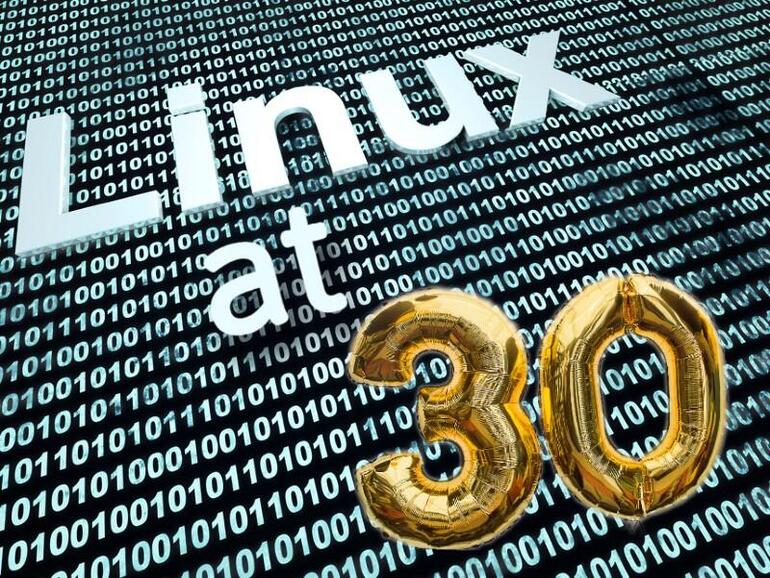Jack Wallen explains how Linux has changed computing for the better and ponders what might be next for the open source OS created by Linus Torvalds.
Today marks the official 30th birthday of the Linux operating system. Let’s all dig into that penguin-shaped cake and talk about where we were when it all began. Or, maybe we’ll chat about all of the fun times we’ve had with Linux over the years, or how it shaped our lives and altered the trajectory of our professional endeavors.
Now let’s talk about the future. After all, we know the past. We’ve learned from our mistakes and celebrated our successes. The thing about prognostication is that it’s nothing more than a guessing game. But sometimes pondering what the future holds can be an enjoyable way of flexing the brain’s muscles and positing a world of possibilities.
SEE: Linux turns 30: Celebrating the open source operating system (free PDF) (TechRepublic)
With Linux, it’s all about possibility. It always was and always will be. That’s probably one of the greatest aspects of the open-source operating system Linus Torvalds created … the impossible becomes possible, and the sky’s the limit. No other operating system can hold to that claim. And in my mind, the next 30 years of Linux should be absolutely incredible.
But with so much success under its belt? Where does Linux go now?
Obviously, in the next 30 years, some seriously remarkable technology will come to light. Chances are, Linux will be at the center of those new developments. But if I could point to one area that should be the focus for Linux in the coming years, I would have to say it’s all about the desktop.
Hear me out before you groan and walk away.
Yes, I’ve been harping on this topic for decades, but I believe it will have a renewed relevance in the future. Why?
Understand, this is just speculation, but it’s speculation grounded in (at least) some level of reality.
Heads in the cloud; feet on the ground
Eventually, I believe the likes of Windows and macOS are going to evolve into cloud-first operating systems. I think both will take a few nods from Chrome OS to become dependent on Microsoft and Apple cloud services. Yes, they will still allow the installation of regular desktop software … at least in the beginning. But eventually, I believe those OSes will evolve into Microsoft’s and Apple’s versions of Google’s popular ecosystem.
And why wouldn’t they? Operating systems aren’t the cash cow they once were. In place of the OS (within the company bottom line) is Software as a Service (SaaS), and Google is the reigning champ of that space. Not content to sit idly by while Google continues to rule a very important business sector, Microsoft and Apple will eventually make a run at that crown.
SEE: My life with Linux: A retrospective (TechRepublic)
All the while, Linux will keep doing what it’s doing. And because the open-source operating system isn’t beholden to a company, it doesn’t need to placate shareholders or help bolster a paid service. Because of that, Linux can keep being Linux and continue evolving into one of the most user-friendly and usable operating systems on the planet.
And that’s exactly what I believe will happen. While Windows and macOS head for the clouds, Linux will keep its webbed feet on the ground and become something traditional computer users will depend on—a standard operating system that allows them to get their work done in the manner in which they’ve grown accustomed.
What about third-party software?
This is where it could get interesting. Should Windows and macOS make the final journey to the cloud, it will put third-party software in a position to have to follow suit. So we could possibly get the likes of Photoshop (and other industry-standard software) that runs completely within a web browser.
You see where I’m going with this, don’t you? That’s right, Linux would stand to benefit from this in ways never before possible. Imagine if every software title that would be run on Windows and macOS could be run on Linux, all from within a browser. No more having to use tools like Wine or beg companies (signing petition after petition) for a native port. It would all just work.
SEE: Linus Torvalds’ greatest hits: A retrospective of the Linux kernel founder’s impact on technology (free PDF) (TechRepublic)
At that point, end-users would have no reason to not use Linux. In fact, if both Windows and macOS do make a break for the cloud, Linux would be the only option users would have for a traditional operating system.
Sounds like IT science fiction, or maybe the fevered dreams of a long-time Linux advocate. But I think it’s a pretty safe bet that, over the next 30 years, proprietary operating systems will continue to keep their sights set on the cloud. I don’t believe it’s that much of a stretch of the imagination to think this possibility will become reality.
Say what you will about Linux, but this has always been an operating system filled with possibility. And as the companies pulling the strings of proprietary platforms make certain changes to improve their bottom line, Linux developers will keep plugging away and doing what they do best … delivering what users need to get their work done.
Here’s to 30 more wonderful years, Linux. As I’ve said before, it’s the operating system that changed my life. I would imagine those changes will continue on in a similar, spectacular fashion.
This is part four of a four-part series on Linux’s 30th anniversary. See parts one, two and three of this series. The entire series is available in this free PDF download.
Subscribe to TechRepublic’s How To Make Tech Work on YouTube for all the latest tech advice for business pros from Jack Wallen.
Also see

Illustration: Lisa Hornung/TechRepublic
Source of Article



